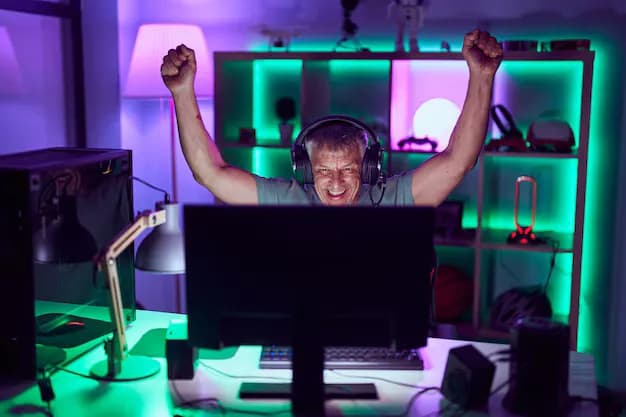
From Pixels to Glory: The Journey of Professional Gamers in the eSports Universe

The Journey to Becoming a Professional Gamer
To become a professional gamer, one has to acquire advanced skills and undergo intense training. This journey starts with choosing a game and spending hours and hours practicing it to achieve mastery. To get to the professional level, aspiring gamers become part of a team or a guild, play in local and international tournaments, and establish themselves on live streaming sites such as Twitch and YouTube. Thus, commitment, great strategy, and constant optimization are among the most valuable assets in this extremely competitive industry.
Understanding the game's mechanics, evaluating the opponents' strategies, and maintaining good physical and psychological condition are also essential. As the number of gamers increases, the availability of resources and training programs that can be used to enhance the skills of the gamers and award them is also increasing.
Early Beginnings
The newcomers to the world of professional gaming have their own story; often, they have some favorite game and want to make a living out of it. The first stages of a professional eSports player are hard work, learning all the aspects of the game, and perfecting them. Preparatory events such as community events and amateur tournaments should be attended and played so the player gains exposure and experience in competitive play. This is the period in the life of these young individuals when they develop their skills, meet other players, and enter the world of eSports.
Professional Pathway
In eSports, there is a clear progression from being a mere gamer to becoming an eSports player, which has major steps. The first of them is to become a member of a competitive team or organization. These teams have set schedules for training, professional trainers, and game plans, which are all critical factors in sharpening skills. Sponsorships are vital in a professional gamer's career as they provide for them and market them. Training amenities add to the ability of a player, and these amenities are usually installed with modern gaming equipment and tools. Networking and having a mentor in eSports are essential because experienced players and managers can share their experiences and help avoid mistakes in the business.
Challenges Faced
However, aspiring eSports players encounter many obstacles, just as in any other professional sport. Physical well-being is a major factor of consideration because gaming involves a lot of sitting, which causes problems such as strained muscles and poor posture. Mental health is also crucial, and the pressure results in stress, anxiety, and burnout among the e-athletes. Mingling the personal life with the intense training and competitive calendar is another challenge, which may call for tactful time management and stable social networks. Also, one cannot underestimate the pressure of financial insecurity in the formative years of the career, which is why dependable sponsorships and endorsements are obligatory.
Triumphs and Success Stories
There are many success stories of professional gamers, and most have a very inspiring background. For example, players like Faker in League of Legends and s1mple in Counter-Strike: Teams playing in their particular titles, such as Counter-Strike: Global Offensive, have risen to stardom and accumulated large paychecks. Participation in major tournaments and winning is imperative since they bring monetary gain and boost the player's status in the eSports industry, thus attracting endorsement deals and other opportunities. In the same way, eSports results can equally create opportunities in content creation, coaching, and even game designing, thus illustrating the various opportunities one can get in the eSports industry.
Training Regimens and Skills Development
The training regimens of professional gamers are rigorous and highly specialized. Players often practice for eight to twelve hours a day, focusing on various aspects of gameplay, such as mechanics, strategy, and teamwork. They use tools like replay analysis and performance tracking software to identify areas for improvement. Mental conditioning, including focus exercises and stress management techniques, is also integral to their training. Many professional gamers work with nutritionists and fitness coaches to maintain their physical health, ensuring they can perform at their best during long gaming sessions. Utilizing resources like the Sleeper Promo Code can provide additional support and opportunities for gamers to enhance their training experiences.
Other Career Pathways in eSports
Even though the most apparent and well-known occupation is being a professional gamer, there are many other positions in eSports. These include coaches, analysts, commentators, content creators, and event organizers. All of these positions are important in the ecosystem and contribute to the players' and fans' experience.
Studying eSports in educational institutions and receiving specific certifications for beginners in the field is now possible. Universities and colleges provide degrees in game design, marketing, management and other related disciplines meaning that there is a clear path one can take from a hobby to a career. Such variety of occupations guarantees that everyone will have his or her place: in front of the camera or behind it.
In conclusion, transitioning from casual gaming to eSports pro isn't simple. There are many hurdles; it takes tremendous dedication, strategic planning, and continual learning. New eSports hopefuls need to embrace skill acquisition, networking, and the cultivation of knowledge on current trends in this highly competitive industry.

Elen Stelmakh er en kreativ person som er opptatt av å fremme spillkulturen gjennom artikler og visuell design. Som heltidsansatt EGamersWorld-forfatter og designer for et spillnettsted skaper Elen ikke bare innhold, men tilfører det også energi og kreativitet.
 Veikart for Maraton: Hva som venter spillerne i sesong 1 og 2Bungie beskriver Marathons to første sesonger i detalj. Oppdag hvordan sesongsystemet fungerer, hva DEATH IS THE FIRST STEP og NIGHTFALL legger til, og hva spillerne kan forvente seg etter lanseringen.
Veikart for Maraton: Hva som venter spillerne i sesong 1 og 2Bungie beskriver Marathons to første sesonger i detalj. Oppdag hvordan sesongsystemet fungerer, hva DEATH IS THE FIRST STEP og NIGHTFALL legger til, og hva spillerne kan forvente seg etter lanseringen. Oversikt over Dota 2 PGL Wallachia sesong 7Alt om PGL Wallachia sesong 7: tidsplan, lag, format og premiepott på 1 million dollar.
Oversikt over Dota 2 PGL Wallachia sesong 7Alt om PGL Wallachia sesong 7: tidsplan, lag, format og premiepott på 1 million dollar. Genshin Impact versjon 6.5: Lekkede bannere, tilbakestilling av sluttspill og nye sonerGjør deg klar for Genshin Impact versjon 6.5. Utforsk kommende bannere med den nye Geo-støtten Linnea, oppdaterte sluttspillutfordringer og den etterlengtede kartutvidelsen Dornman Port.
Genshin Impact versjon 6.5: Lekkede bannere, tilbakestilling av sluttspill og nye sonerGjør deg klar for Genshin Impact versjon 6.5. Utforsk kommende bannere med den nye Geo-støtten Linnea, oppdaterte sluttspillutfordringer og den etterlengtede kartutvidelsen Dornman Port. Arachne: Belønninger og oppdrag i Marathon-fraksjonenUtforsk Arachne i Marathon: kontrakter, oppgraderinger, belønninger og taktiske tips for å dominere PvP. En komplett guide til fraksjonen bygget rundt kampprogresjon.
Arachne: Belønninger og oppdrag i Marathon-fraksjonenUtforsk Arachne i Marathon: kontrakter, oppgraderinger, belønninger og taktiske tips for å dominere PvP. En komplett guide til fraksjonen bygget rundt kampprogresjon.





